The null hypothesis
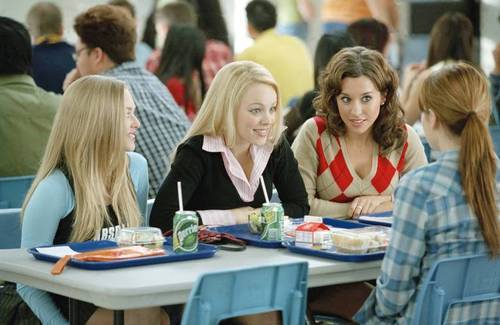
stop trying to make fetch happen
I.
What does the popularity of Fifty Shades of Grey say about American culture?
Emma Green of The Atlantic says that “Fifty Shades casually associates hot sex with violence,” and that it raises “questions about what it means to ‘consent’ to sex. Clearly, consent is necessary; but is it sufficient?” and “If anything has the power to shape sexual norms, this does.”
Amanda Hess of Slate, in an article that 100% triggered me, says that the movie "allows the audience to feel superior to the source material while experiencing the guilty pleasure of discovering that maybe they actually really like this stuff,“ and "I left the movie feeling like I’d just been on a first date with someone I’d secretly crushed on for a long time. I’d definitely see it again.”
Mark Davis of The Dallas Morning News says that the movie “is evidence of a damaged society, a nation that thinks it is just swell to celebrate the story of a predatory billionaire punk who victimizes a tragically vulnerable woman for his own sick entertainment.”
Joseph Heschmeyer, slimebag of the ecumenical (?!) journal First Things, says “Spouses in gender-fluid marriages have less sex, and less satisfying sex. Researchers have found that the 'more traditional the division of labor, meaning the greater the husband’s share of masculine chores compared with feminine ones, the greater his wife’s reported sexual satisfaction.’ Here, it seems, Fifty Shades of Grey comes into play, tantalizing readers with a world in which men aren’t afraid to lead, and women feel safe submitting.”
Lizzie Crocker of The Daily Beast says that “For all its supposed titillation and challenging of sexual mores, Fifty Shades couldn’t feel more conservative and stilted,” and “Why Fifty Shades appeals to so many is simpler than a thousand think pieces would have us believe. It’s a safe walk on the dark side; the faintest brush of a tassel-whip, then home in time for tea.”
Leslie Bennetts of Entertainment Weekly, in article titled SEX, LIES, AND FIFTY SHADES: MILLIONS HAVE READ THE BOOKS. MILLIONS MORE WILL SEE THE MOVIE. AND EVERYTHING YOU THINK YOU KNOW ABOUT IT—AND WOMEN—IS WRONG, says that “Fifty Shades of Grey may represent the ultimate appropriation for capitalist consumption of themes that have resonated throughout history, but one thing its popularity can’t tell us is the truth about female sexuality,” because “From earliest childhood, women’s experience of sex is so inextricably intertwined with all forms of male control that submission is forever eroticized in more ways than we can possibly unravel.”
Which of these contradictory interpretations is correct? Personally, I think that Crocker best understands the movie’s gimmick and Bennetts best explains the underlying cultural issues. But none of these critics admit that Fifty Shades might be popular for a totally banal reason that has nothing to do with content: none of them disprove the null hypothesis that the movie is popular because a lot of people were told to go to the theater and watch it.
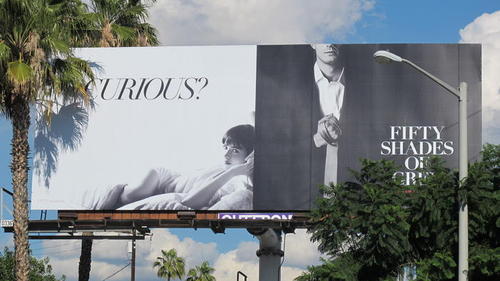
The ads were fucking inescapable. I saw them plastered over the walls of LAX, I saw them on billboards, I saw them suggested by Facebook. SNL, Durex, and the Spongebob Movie did parodies of it, and if you don’t think parodies are advertising, then ask yourself why poor old Obama is participating in a Buzzfeed article. (Remember, use protection! Adblock on before clicking links, please.) Hot Topic made a t-shirt. Tie-in teddy bear. Ellie Goulding, The Weeknd, and Beyoncé released music videos for their songs on the Fifty Shades soundtrack. (Don’t worry, Queen Bey is still a Goddess and a feminist and a U.N. Ambassador or whatever.)

Movie studios don’t release advertising budgets, but the marketing campaign was three years in the making and by every metric successful [1]. The marketing coup d'etat was the trailer, which played during “Scandal,” “How to Get Away With Murder,” NBC’s “Today Show,” the Golden Globes, and the Super Bowl XLIX. Of course, if you’re like me, you don’t watch live TV—Netflix streaming or die trying. So where did you hear about the trailer?
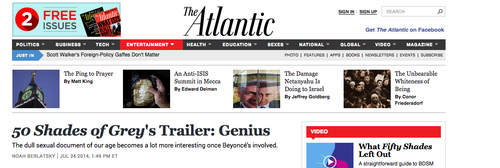
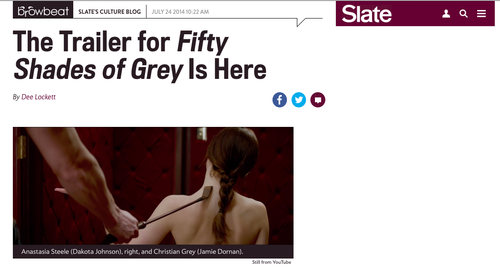
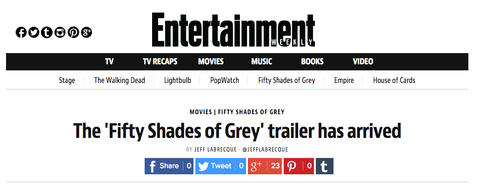
Not my line, but “If you’re seeing it, it’s for you.“
II.
Popularity is self-reinforcing. Once something is popular enough to be part of the "national dialogue,” previously uninterested people have to investigate if they want to have an “informed opinion”; this opinion (good or bad) is posted to social media, more people join the national dialogue, more people investigate, and so on and so forth. How about that dress, huh? Blue-black or white-gold?
Controversy is a way to jump-start something into the national dialogue, and I mean controversy in the broadest possible sense, like “anything on which you can have an opinion.” The media plays both sides of a controversy: it gets hits on the article with the movie trailer, and it gets hits on the article criticizing the movie. The media cares not from whence the hits come.
What does the popularity of Fifty Shades of Grey say about American culture? I don’t know, what does the popularity of Pirates of the Caribbean: Dead Man’s Chest say about our culture? Iron Man? Shrek 2? All three movies had bigger opening weekends than Fifty Shades; all three were heavily advertised. The kids on the playground are talking about Iron Man and if you want to participate you have to go watch it; you do, and now there’s one more kid on the playground talking about Iron Man. Remember that Kim Kardashian #BreakTheInternet photo a few months back? What did that say about our culture?
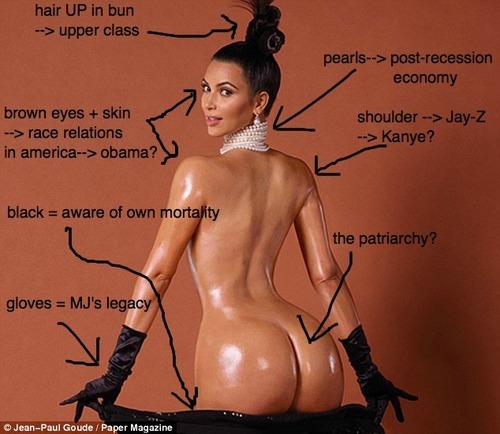
In this incredibly smug op-ed, an editor of Paper magazine (in which the Kim K photo was published) says:
Which brings us to the first rule of how to create a pop phenomenon: be polarising. Kim Kardashian is both loved and loathed. Detractors tend to play the talent card, as if America only rewards the talented actors and artists and musicians creating culture today. Perhaps what enrages people is that she doesn’t claim to be any of those things.
So a mostly-reviled mostly-talentless wealthy attractive woman boasts that she has the power to “break the internet,” and >70,000 people take the time to retweet the photo and post about how this is an outrage and how Kim K will definitely not break the internet. Goddamnit, the whole point was to make you mad—you just fell for the advertising equivalent of negging. And once the media gets the scent:
The reality star’s photos were taken by a white photographer with a history of playing up racial tropes about black women’s bodies. Kardashian’s willingness to go along with the shoot — and the relative ignorance of the majority who have commented on it — reflects a disturbing lack of awareness when it comes to the exploitation of black bodies, specifically black women. (Mic)
For a woman’s rear to truly be fetishized, her face has to be turned away, rendering her slightly less human. It’s a pose that Kardashian does her best to counter, wrenching her neck toward the camera as best she can, but it doesn’t seem wholly comfortable. (The Atlantic)
Insightful cultural commentary, no doubt, too bad it has nothing to do with why anyone shared the photo, too bad it contributes to the problem and spreads the photo that much more. At long last, the dinosaurs awaken. “Kim Kardashian bares her assets for Paper mag; Internet still intact,” the LA Times gleefully reports. “Fear of Kim Kardashian’s Derrière,” chortles the NY Times headline. TIME magazine posted three separate articles on the day of the incident, featuring Pulitzer-caliber prose like “Paper magazine is just what it says it is: a magazine made of paper, and it costs money to buy it.” When every major news publication makes it a point to say “You didn’t break the Internet,” you have broken the Internet. I don’t know if the individual columnists realize they are part of the problem, maybe they earnestly believe “The people need to know!” or maybe they figure “If I don’t do it, someone else will,” but the end result is the same.
And so here’s a conversation I overheard the day before Fifty Shades was released in theaters.
Person 1: So are you going to see Fifty Shades of Grey this weekend?
Person 2: Yeah, I’m going to see it with some girlfriends. I wish they’d gotten someone hotter for the main actor, though.
Does Person 2 sound like she is on a soul-searching quest to understand consent, power dynamics, gender roles, and the long history of male control of female sexuality? Or does she sound like she’s looking for a movie to see with some friends? I don’t mean to malign Person 2: back in 2009 I saw Transformers: Revenge of the Fallen—a jingoistic explosion-fest with fewer redeeming features than Fifty Shades—with four guy friends, even though it had been panned by critics and I knew it was going to be terrible, because a) it was in theaters, b) it was movie night, and c) I wasn’t going to suggest My Sister’s Keeper. As a former glass house owner, I know better than to throw stones. But you need to understand, because Tumblr and Reddit don’t, that most people don’t read the blogs you read and most people don’t care. Person 2 doesn’t keep up on pop culture criticism because she’s a nurse working twelve hour days five times a week and a 43 year-old mother who’s not exactly George Takei in terms of internet savvy; her exposure to Fifty Shades is TV ads, billboards, word-of-mouth, and the headline of an article she scrolls past while on Facebook: SEX, LIES, AND FIFTY SHADES. “I didn’t know there was such controversy,” she thinks. “I guess I’ll have to see the movie and decide for myself.”
III.
You’re allowed to have a reaction to art.
I’m sure many of the people who watched Fifty Shades of Grey—a majority?—would not say that they saw the movie because it was advertised to them. Maybe they’ve always had a casual interest in BDSM and wanted to learn more, maybe they’re a couple looking to kink up the bedroom, or maybe the movie triggered some personal psychosexual revelation, in which case, good for them.
Every individual who watches Fifty Shades has an individual reason for watching it, but that doesn’t mean that population effects aren’t present.
An analogy: there is a strong argument (including randomized controlled trials) that the decrease in violent crime from 1985 to the present is related to increased consumption of Omega 6 fatty acids, decreased lead exposure, and/or increased lithium intake. Same thing with, say, improved childhood nutrition and adulthood IQ. A subtle effect multiplied by a country’s population becomes significant.
But if you asked a pre-1985 criminal why he was shooting up the general store with a Tommy gun, I guarantee he wouldn’t answer “Uh, lead exposure and insufficient Omega 6 intake.” He’d probably say “Well, I always had a casual interest in being gangster, and I wanted to learn more.”
W/r/t the movie, the most convincing evidence of a cultural effect is when one group has a disproportionate consumption to advertising ratio [2]. 20-40 year-old women saw Fifty Shades more, but the ad campaign—Ellie Goulding, The Weeknd, Beyoncé, Pinterest, Scandal, How to Get Away With Murder—was targeted at 20-40 year-old women. Does that say something about women or about advertising? You have not disproved the null hypothesis. “But why was the ad campaign targeted at chicks, unless chicks were gonna watch it?" Cultural memes spread laterally through society, but they spread longitudinally through time as well: teen girls read Twilight, so Twilight was "for chicks,” so Fifty Shades was written “for chicks,” so the Fifty Shades ad campaign was designed “for chicks,” so women go to see the movie, so chucklefucks post about how women are biologically programmed to want romance with BDSM billionaires. Really? You (male) realize that Judd Apatow films are romances, right? How about Princess Bride? Annie Hall? Is Secretary a chick flick? Is the Story of O mommy porn? Conversely, you (female) say that Fifty Shades affected you strongly, but it wouldn’t have affected you if you hadn’t heard of it, heard of it with specific branding and context, and if something else was the Big Thing maybe you would have liked that just as much. And so here’s the million-dollar question: what do you want to be the next Big Thing?
IV.
If certain internet content is said to be “viral,” it follows that the source of that content is infectious. When something is infectious, it is unwise to wave it around yelling “HEY, THIS IS BAD AND IT WILL MAKE YOU SICK!”
They may target different audiences, but American Sniper has the same marketing strategy as Fifty Shades: huge advertising push (more than $50 million spent on TV ads alone) + controversy = $$$. The people going to see Sniper are predominantly conservative—do you think a salon.com article is going to persuade a guy who voted for Mike Huckabee? Warner Brothers thanks you for the free advertising.
Depending on the audience, even accurate cultural criticism is ineffective. Write as much as you want about how Nicki’s twerking is feminist but Iggy’s is cultural appropriation, 100% of the overlapping fanbase doesn’t care. You’re missing the point anyway, your outrage shouldn’t be at Iggy for being awful, your outrage should be at the system for giving you so few options that you think a corporate-constructed pop star is a feminist just because she’s the lesser of two evils [3].
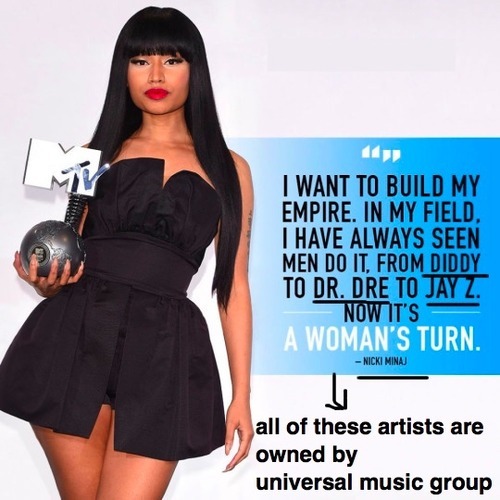
I don’t mean to be a buzzkill—I like Nicki, she has a great verse on “Monster” and her verse on “Only” ain’t bad—but don’t post-hoc yourself into thinking there’s anything progressive about her. From the Huffington Post:
Today, in Fifty Shades, we find a new strength. The power to be submissive and still be in control. There is a power in being dominated, and yet not losing the ability to say “stop” or “no.”
Which I’m sure prompted a thousand comments about how “No, Fifty Shades is terrible.” It is. That’s not the point. The Dom here is capitalism. The Sub is you. Maybe if you grit your teeth and bear it the two of you can go on a date.
V.
If you’re going to do pop culture criticism, do it as art, as personal expression. Don’t count on convincing anyone, because your angle is one of 360, people seek out arguments that support their preexisting beliefs, and there is a good chance readers will skim the first paragraph and hit Cmd + W anyway.
If you’re going to do pop culture criticism, wait until the hype dies down, because else you will become part of the hype.
If you’re going to do pop culture criticism, turn on Adblock. Do not post clickbait headlines on Facebook, Twitter, or Instagram. Do not reblog, retweet, or repost the content of anyone who is making money off of the controversy (sorry). Don’t announce a boycott—just don’t show up.
If you’re going to do pop culture criticism, recognize that the reasons you have for disliking something are often totally unrelated to the reasons other people have for liking it.
Cultural memes are viruses. You can’t cure a virus with antibiotics. The best way to stop a virus is to not get sick.
Don’t get sick.
[1]. I can imagine someone objecting that the novel version of Fifty Shades was “organically” successful long before the movie; however, the novel only sold 250,000 copies before the rights were acquired by Random House, the largest general-interest book publisher in the world. Random House did its mojo, and the book has sold 100 million copies since. Also note that even the hype for the paltry-in-comparison 250,000 copies was based off a mainstream media ad campaign, namely the ad frenzy of the Twilight saga on which Fifty Shades was based.
[2]. A good example of this is Morrissey’s popularity in the Mexican-American community; The Smiths never tried to sell to this demo, so their popularity is probably the result of a legitimate cultural phenomenon.
[3]. I’ll leave the U.S. politics/two-party system analogy as an exercise for the reader.